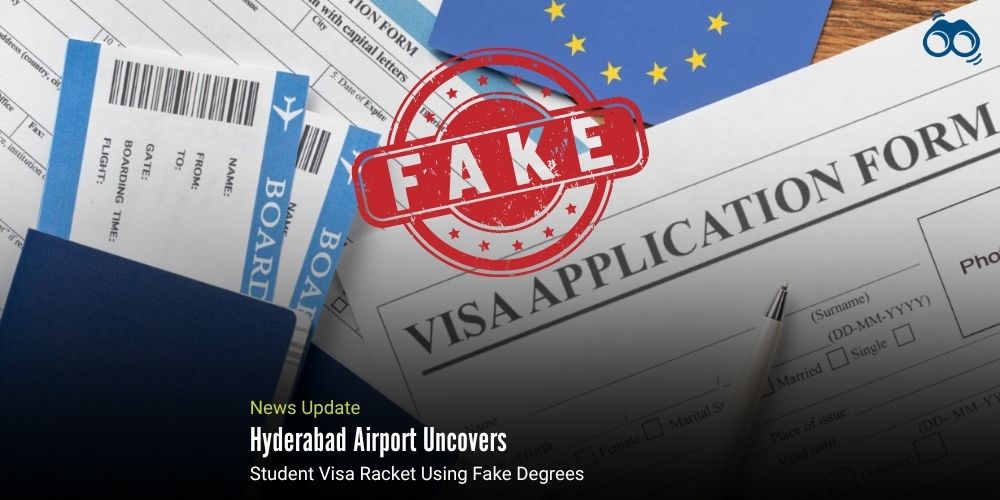Fake Certificates Fuel Overseas Dreams: Immigration Officials Sound Alarm
Academic Fraud Ring Exposed at RGIA; Four Arrested in Visa Scam
In a troubling development that raises serious concerns about the integrity of international student mobility, Indian immigration authorities have uncovered a growing pattern of academic fraud at Hyderabad’s Rajiv Gandhi International Airport (RGIA). Over the past two weeks, four individuals were intercepted by the Bureau of Immigration (BoI) while attempting to travel abroad using forged academic credentials, despite having successfully cleared formal visa interviews for the United States and the United Kingdom.
Investigations revealed that these individuals had secured both university admissions and student visas using counterfeit degrees, some of which were allegedly arranged through dubious education consultants. These revelations have prompted heightened scrutiny at departure points and renewed calls for stricter oversight of education consultancy practices and document verification procedures. According to the BoI, the academic frauds were detected during additional pre-departure screening. The first significant case emerged on 1 June with the detention of Pakeeru Gopal Reddy, 28, from Nalgonda district. He had originally entered the US in September 2023 on a student visa, using a fake BSc (Computers) degree from Madurai Kamaraj University, and enrolled at Webster University. After 15 months, he returned to India, citing personal reasons.
However, in May 2024, Reddy was deported from Dallas airport due to an inactive SEVIS (Student and Exchange Visitor Information System) record. Upon his arrival in Hyderabad, immigration authorities discovered that his academic documents were forged. He later confessed to obtaining the fake degree through an agent named Katoju Ashok, associated with Sri Dhanalakshmi Overseas Pvt. Ltd. in Vanasthalipuram. Gopal was arrested on 1 June, followed by Ashok's arrest the next day.
BoI officials remarked that these arrests point to a growing trend of students using forged credentials, often facilitated by education consultants, to obtain student visas for the US and UK. In response, authorities have decided to monitor this pattern more closely. On 9 June, another individual, Mohammad Shahabazuddin, 26, from Hyderabad, was intercepted while attempting to travel to the UK. He was found in possession of multiple forged documents, including a fake BCom degree from Acharya Nagarjuna University, a counterfeit Intermediate certificate, and fabricated BTech certificates from two Hyderabad colleges. He admitted to purchasing a forged SSC certificate for ₹1.5 lakh from an individual named Yakub and creating the other documents using editing software. A case was registered on 10 June, and he was taken into custody.
The following day, on 10 June, Mohammed Azhar Hussain, 25, from Seetharampuram in Miryalaguda, was stopped at RGIA while en route to the UK via Dubai. During interrogation, he confessed to using forged certificates from Capital University in Jharkhand and a fake job offer letter, which had reportedly been arranged by an individual named Bharat from Emerge Migration Overseas Educational Consultancy. A police complaint was filed, and Azhar was remanded to custody.
On 12 June, yet another case surfaced when Srikanth Marthala, 26, from Guntur, was intercepted with a forged BTech degree from Koneru Lakshmaiah Education Foundation. He admitted to paying ₹40,000 to a local agent, Mohan Krishna, in exchange for the fake certificate. A case was registered, and Srikanth was also remanded to judicial custody. In light of these recurring incidents, RGIA officials now suspect a broader network of academic fraud involving multiple agents and consultancy firms. The RGIA police have accordingly expanded their investigation to identify and apprehend additional individuals involved in the racket. The probe remains ongoing. These cases underline the urgent need for stricter regulation of overseas education consultancies and enhanced scrutiny of student visa applications.
Editor’s Note:
The recent revelations of academic fraud at Hyderabad’s Rajiv Gandhi International Airport are not merely isolated incidents; they are symptomatic of a deeper malaise afflicting the overseas education ecosystem. The fact that individuals were able to secure student visas for prestigious destinations such as the United States and the United Kingdom using forged documents is a stark indictment of both domestic and international vetting mechanisms. This alarming trend raises urgent questions about the ethical standards of certain education consultancies, some of which appear to have evolved into rackets exploiting the aspirations of gullible students and the loopholes in visa processing systems. While the students involved must bear responsibility for their actions, the enabler agents and consultants who profit from manufacturing credentials must be held to far greater account. Equally troubling is the apparent ease with which counterfeit documents are produced and passed off as legitimate. This not only undermines the credibility of genuine academic institutions but also places undue pressure on immigration systems, which are already burdened by high volumes and complex processing demands.
Skoobuzz underlines that it is imperative that both Indian authorities and foreign missions adopt more robust verification protocols, and that stricter regulation is imposed on education consultancies. Transparency, accountability, and cross-border cooperation must now take precedence over unchecked ambition and procedural complacency.














0 Comments (Please Login To Continue)